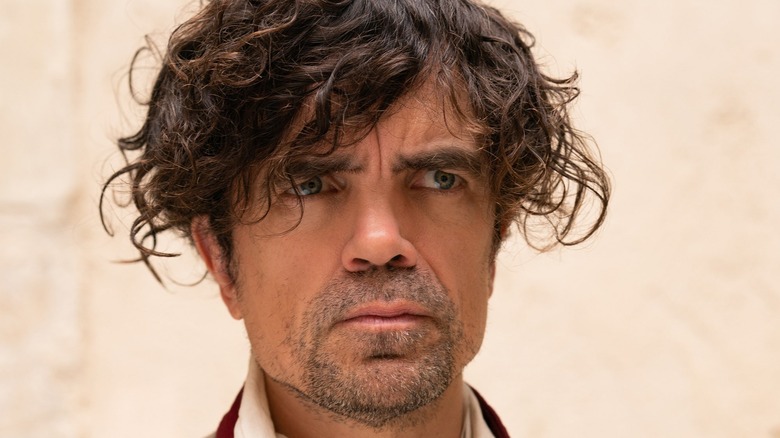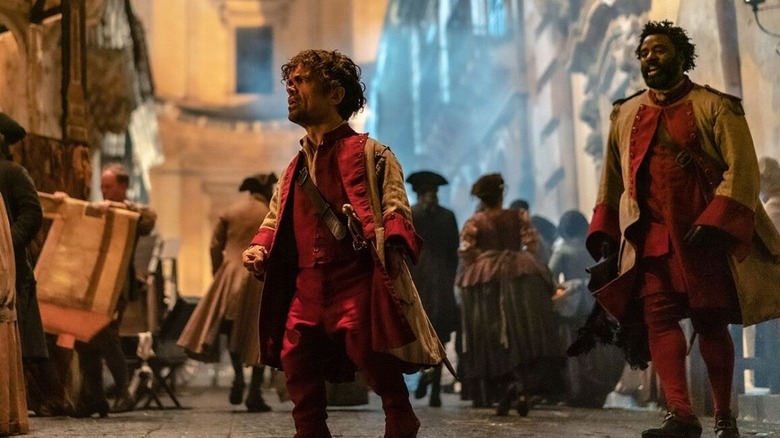Cyrano Review: Not The Bergerac Everyone Nose
Peter Dinklage has spent his entire career speaking out against the stereotypical roles actors with dwarfism are routinely offered. In his first screen appearance, in the 1995 indie "Living in Oblivion," his struggling actor character ranted against filmmakers forcing him into harmful, cliched roles. More than 25 years later, his career-long advocacy is still falling on deaf ears in Hollywood, with his recent criticisms about Disney's upcoming "Snow White" remake proving little progress has been made since. The actor has long said that his dream role is playing the "romantic lead who gets the girl" — in other words, the character archetype that has been furthest out of reach for any performer who doesn't fit the industry's exact specifications. Dinklage is widely renowned as one of the best character actors working today, and yet the vast majority of his roles fall within the sidelines of an ensemble, that romantic lead status forever out of grasp.
On paper, a reimagining of the enduring 19th century play "Cyrano de Bergerac" doesn't seem like a particularly appropriate project for the actor. For someone who has been as vocal about typecasting, and as hesitant to take problematic roles, as Dinklage, a screen adaptation of the famous story about a man who is defined entirely by his physical appearance might appear like he's belatedly embracing the kind of project he has made a point of refusing. But "Cyrano" is a far smarter retelling of this story than it initially appears, subtly challenging the ideas of who gets to be central to a romantic narrative even as it stays true to the framework of Edmond Rostand's original stage production. It may seem like an odd thing to say about a story famous for its streak of lovelorn tragedy, but there's something surprisingly empowering about this adaptation that may not make itself apparent at first glance — a stubborn refusal to define this character in the way he views himself, or is seen by many in the world around him.
Subtly breaking new ground
The screenplay for the film has been written by Dinklage's wife Erica Schmidt, based on her own stage production that premiered in 2018, in which the actor also starred. As you'd expect, it's a star vehicle tailor made to his strengths, all while gently subverting many of our own preconceptions when it comes to this world famous story. In earlier adaptations, Cyrano's disability is an oversized nose which makes him feel unable to be loved, something excised from the narrative entirely here. Schmidt hasn't simply replaced this with dwarfism, allowing for a far richer and much less reductive reinterpretation, where a character's inherent condition isn't so much the cause for their suffering as their lack of self belief. From the moment of introduction, it's clear Cyrano commands more power than anybody in the room; his clearer flaw that stops him from being able to have love is his resistance to opening up and allowing himself to be emotionally vulnerable.
The dynamics of the story remain the same, however. Cyrano is hopelessly in love with Roxanne (Haley Bennett), a close friend since childhood he's never been able to confide to about his affections. One day, the soldier Christian (Kelvin Harrison Jr) comes to town, and it's love at first sight between him and Roxanne. Confiding in Cyrano, Roxanne asks if he can help bring the two together — he reluctantly agrees, but upon finding Christian is awkward with words, agrees to ghostwrite love letters that will help him win her affections, the words all reflecting his true emotions, hidden under a different name.
Schmidt and director Joe Wright don't alter the story so much as add further depth to the characters within it, although it's the titular role that is by far the main beneficiary. Upon introduction, dramatically derailing a stage play because of his dislike of its lead performer, it becomes clear that this is as much adding depth to the archetypal roles offered to Dinklage in a post-Tyrion Lannister world as it is reinterpreting Cyrano himself.
He's a cocky badass, who can win any fight or argument thrown his way — but whereas his Emmy-winning role's interiority often got lost beneath the spectacle of the Seven Kingdoms, here his inner torment is laid bare. He's only ever viewed as lesser by people he's rubbed up the wrong way with his bravado and fighting talk, but that's enough to fester in his imagination, and affect him beyond the brave face he routinely puts on. It's one of his finest big-screen performances, and a testament to how sometimes, casting an actor to type based on their most famous roles can yield powerful results that subvert all expectations.
The song remains the same
The other novelty of Wright's film is that it's a musical adaptation, with songs written by Aaron and Bryce Dessner of the National. Having seen the film twice now, I confess to not being won over by the music on first viewing, but a second watch helped emphasize the specific way in which the songwriting strived to modernize the original play — taking the letters and poetry from the original English language adaptation and reinterpreting these as palatable song lyrics that hewed as closely to the source material as possible. As a result, you'll likely find more immediate earworms in "West Side Story," but it makes for a collection of songs that only get more rewarding with each repeat listen.
This isn't to say there aren't conventionally anthemic moments of musical theatre here; the haunting number "Wherever I Fall" pulls off the impossible task of introducing minor characters directly before they face their own tragedies, while Ben Mendelsohn, playing Roxanne's toxic would-be suitor, gets his own Disney villain-style number. This proves to be the sole highlight of Mendelsohn's performance; being placed next to Dinklage, who has aimed to avoid typecasting his entire career, only makes Mendelsohn's tired villain schtick even less satisfying.
It's undeniable that "Cyrano" doesn't feel as dynamic as other stage musicals this year; its songs often veer into sung through stream of consciousness conversations, and are almost universally staged like a conventional conversation scene. But what it lacks here, it more than makes up for as a powerful love story — and for Dinklage, the ultimate star vehicle, that feels like the culmination of everything he's ever advocated for in terms of rewriting Hollywood's history of problematic roles.


